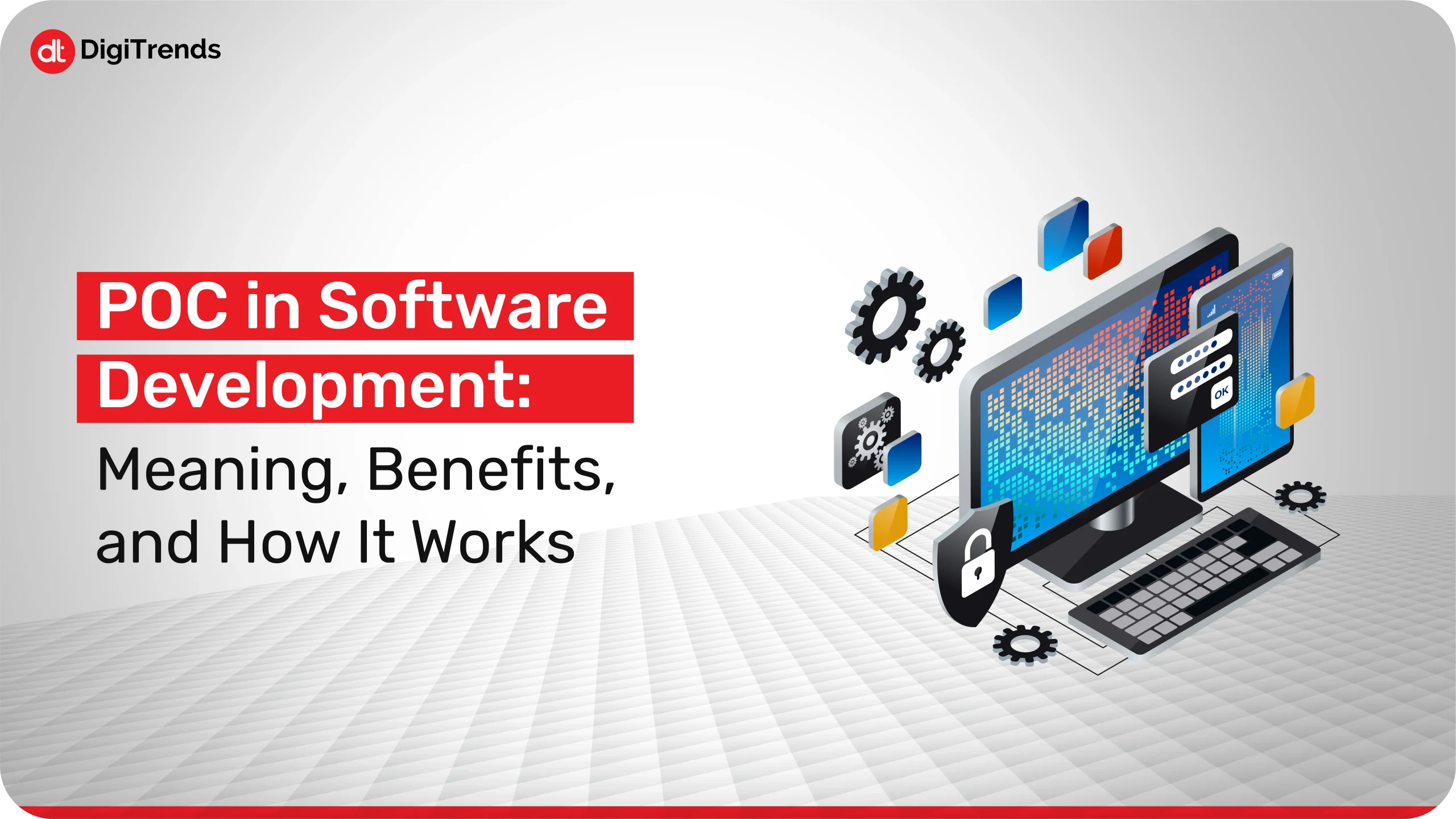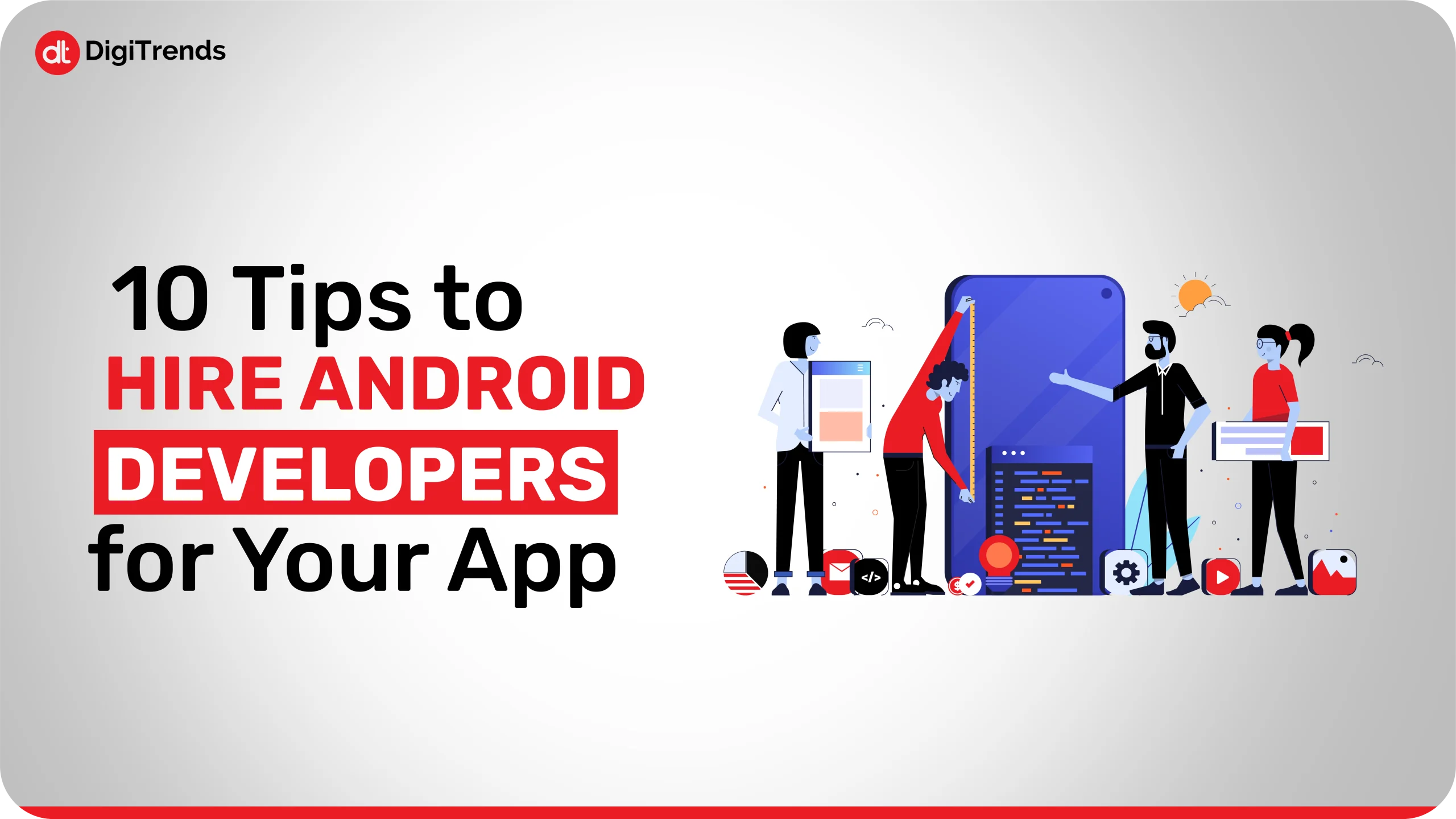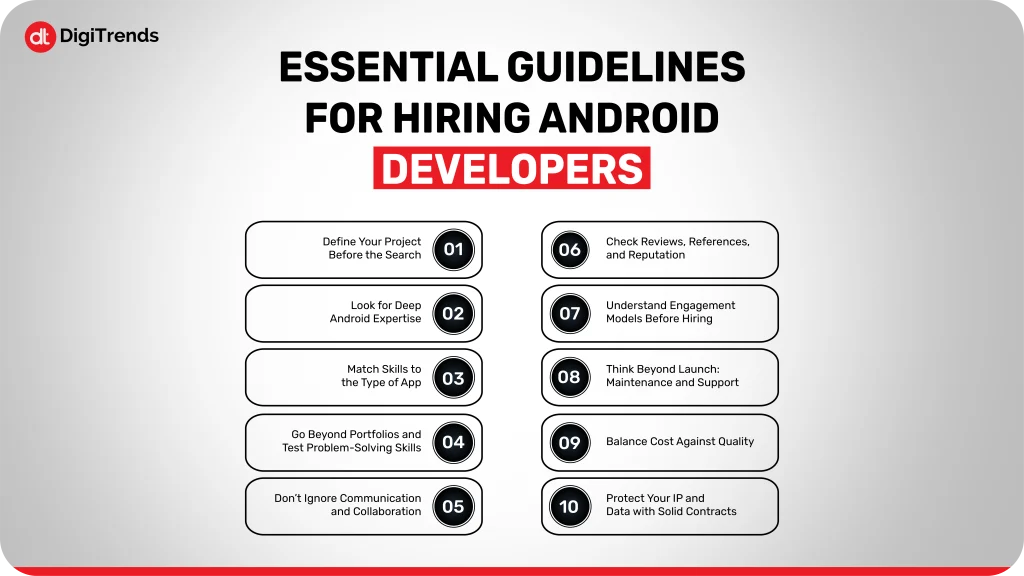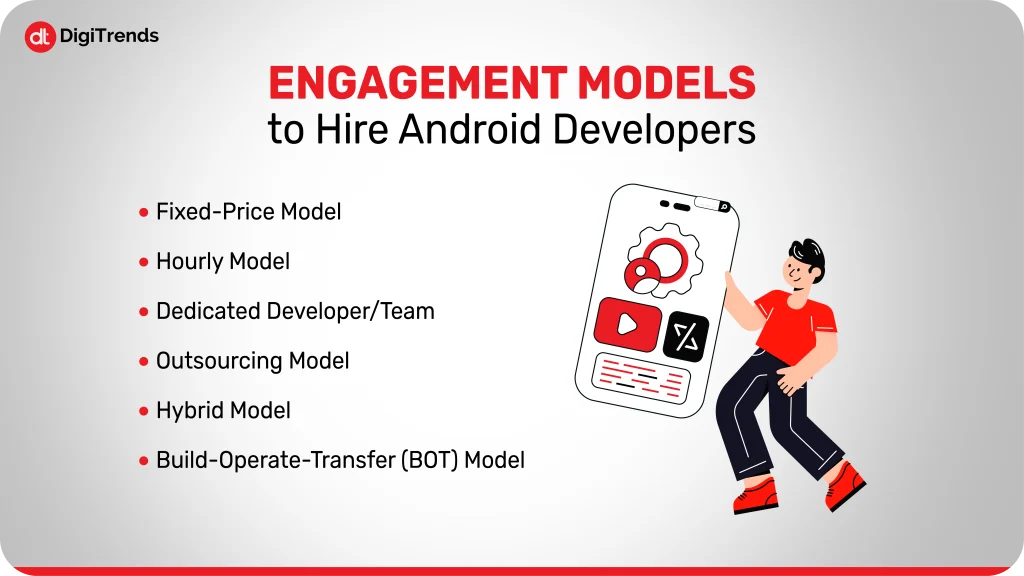
POC in Software Development: Meaning, Benefits, and How It Works
Explore what Proof of Concept (PoC) in software development is, how it benefits teams in making better decisions, and how it works.
Continue Reading
If you are planning to develop an Android app, you might feel like your idea and concept are going to decide the success of your app.
But what will actually determine the way your app performs in the highly competitive market is the developers behind it.
Without efficient Android developers, even the most amazing and unique idea might not work in the market. The developer or team you hire will decide whether your app turns out polished, scalable, and reliable, or if it ends up draining your budget and falling short of user expectations. Android is a massive ecosystem with 3.6 billion users worldwide, and competition is stiff.
That’s why hiring the right Android developer is one of the most important decisions you’ll make in your app journey.
Hiring development teams can be a little overwhelming. There are various options, including freelancers, agencies, and outsourcing firms. Whatever you choose will come with its own risks and rewards.
Let’s break down the hiring process into ten detailed tips that will help you find the best Android developers for your app.
How you choose to hire Android developers can decide whether your app will make it or fail.
Finding the right team that can understand your vision, has the right skills, and can deliver a product according to your requirements can be tough. Let’s make the decision easier by going through 10 practical tips for hiring the best Android developers.

One of the first and most important steps of any kind of development project is to gather ideas and clearly define the objectives, goals, and expected outcomes before jumping into the hiring or development phase.
Imagine looking for an architect to design your house without having any idea about the structure that you want. You might end up choosing the wrong team for your project and waste time and money on the wrong one. The same goes for app development: first decide what you want, then hire and develop.
Before hiring developers, take time to write a clear project brief. This briefing should include the core idea, your target audience, and the specific integrations needed, such as payment systems, analytics tools, or enterprise software connections. You must also have a clear vision about whether your app needs offline functionality, heavy multimedia use, or support for multiple Android versions and devices.
There’s no need to get into technical details; that’s what developers will help with, but the clearer you are about what you want, the easier it will be to filter candidates.
Not all developers acquire the same skills; some developers specialize in iOS, some in cross-platform tools like Flutter or React Native, and some in native Android.
For a high-quality Android app, you will need a team with deep Android development expertise. This means hands-on experience with Android Studio, Kotlin, Java, and the Android SDK.
An expert Android developer would be able to understand design guidelines set by Google, like Material Design principles, so that the apps not only function well but also feel intuitive and familiar to users.
It is better to look for their past work, whether they’ve worked with Android Jetpack libraries, dependency injection tools like Hilt, and architecture patterns like MVVM. A strong developer would also be comfortable with testing frameworks, version control systems like Git, and continuous integration tools.
The best way to know their expertise is to look at their portfolio, ask to see their past work, and the apps they have worked on. The best thing you can do is install those apps and check how to get a better understanding of a team’s technical ability.
There are different kinds of Android apps; a developer who specializes in creating a simple utility app might not be an expert in creating a complex fintech app with security compliance. Similarly, someone who’s great at building gaming apps may not be suited for an enterprise solution.
Your choice will depend on the type of app you are looking to create. If you are looking to build an e-commerce app, you’ll want someone experienced with product catalogs, secure payments, and user authentication. If it’s a healthcare app, experience with HIPAA compliance or secure data handling will be essential. For location-based apps like ride-hailing services, you’ll want to know that your developer has worked with GPS, maps, and real-time tracking before.
Matching the developers’ skills with the type of app will make sure that your development team doesn’t learn critical technologies at your expense. Instead, they would have worked with that kind of app, would be familiar with the complexities, and how to handle them.
The portfolio of the developer will define the technical expertise of the developers, but when hiring Android developers for your app, you must not only depend on the portfolio but also look at the problem-solving skills of the development team, because no project will run smoothly. APIs fail, libraries break, and unexpected bugs creep in, so the team should be able to handle these problems.
During the hiring process, ask developers to walk you through a challenge they faced in a past project. How did they identify the problem? What options did they consider? Why did they choose the final solution? This gives you a window into their thought process.
You can also give candidates a small paid test project. It doesn’t have to be complicated, something like creating a login screen with a secure authentication flow or fixing a performance issue in an existing app.
What matters isn’t just whether they deliver but how they approach the task. Do they write clean, maintainable code? Do they communicate clearly about their progress? Do they meet the agreed timeline? These small tests reveal far more than a polished portfolio ever could.
When you hire Android developers for your app, don’t just look for technical skills because soft skills like communication and collaboration are just as important. Even the most talented developers can fail at delivering outcomes if they don’t know how to communicate and collaborate effectively.
You’ll want a developer who can explain technical concepts in plain language, especially if you’re not from a technical background. They should be proactive about asking clarifying questions before starting work rather than making assumptions. Regular updates, openness to feedback, and transparency about progress are also essential.
Pay attention to how they interact with you during the early conversations. Are they quick to respond? Do they listen carefully to your requirements? Do they seem organized and professional? These small cues often predict how they’ll behave once the project begins.
One of the important steps when hiring Android app developers is to check out their reviews and reputation. Imagine discovering halfway through a project that the development team you chose frequently misses deadlines or abandons projects whenever things get tough.
So when you hire Android developers, look for platforms where you can find reviews and ratings. If you are hiring a team, then you can easily look them up on platforms like Clutch or GoodFirms. When hiring freelancers, you can find reviews on UpWork or Fiverr. Don’t hesitate to ask for references from past clients and actually follow up on them. A quick call or email can tell you a lot about how the developer communicates, whether they deliver on promises, and how they handle setbacks.
A strong track record is often the best predictor of future performance. Developers who consistently deliver quality work and maintain good client relationships are less risky than those with little or no history.
When you look to hire Android developers, you’ll come across different engagement models. Understanding these models will help you pick the right one for your project.
An hourly model works well if your project is small or you’re not sure about the scope yet. It gives you flexibility, but it can be unpredictable if the work drags on. A fixed-price model is better when your project is clearly defined. It gives you a predictable budget, but you’ll need to lock down your requirements early to avoid change requests.
If you expect long-term development or continuous updates, a dedicated team model may be the best fit. This gives you a group of developers working exclusively on your app, which ensures consistency and faster progress.
Some companies also use outsourcing models to hand over end-to-end responsibility to a development partner, while others opt for Build-Operate-Transfer (BOT) models, where an external company builds your app and team, then transfers ownership to you once it’s up and running.
A hybrid model that mixes these approaches can also work, especially for startups that need flexibility.
Knowing these options in advance helps you choose a structure that matches your risk tolerance, budget, and timeline.
Building an app doesn’t stop at the launch; an Android app needs regular updates, bug fixing, new features, and much more to stay competitive. Google frequently changes its operating system, too, and each update can change the way your app operates. Which means that apps need constant maintenance and support.
This is why it is important to discuss post-launch matters when hiring Android developers. Ask whether they’ll be available for ongoing maintenance and how they handle updates. Do they provide a support plan? How quickly do they respond to bug reports? Will they handle Play Store submissions and updates on your behalf?
Neglecting maintenance is a common mistake that people make when they hire Android developers, and it is a really important aspect that can quickly make an app outdated. By planning for it early, you ensure that your app stays functional, secure, and competitive long after launch.
It’s tempting to make cost the main factor when hiring Android developers, especially if you’re on a tight budget. But the cheapest option can often end up being the most expensive in the long run. Poorly written code leads to higher maintenance costs, performance issues, and unhappy users.
Instead of focusing only on hourly rates, think about value. A more experienced developer may cost more per hour but deliver work faster and with fewer errors, saving you money overall.
Look at the total cost of ownership, which includes initial development, maintenance, scalability, and the potential revenue you might lose if the app is delayed or poorly built.
Investing in quality upfront usually pays off. Remember, your app represents your brand. If it crashes frequently or feels outdated, users will delete it in seconds and move on to a competitor.
Last but not least, don’t overlook the legal side of things. Your app is intellectual property, and you want to make sure you own it fully. This means signing contracts that clearly state that all code, designs, and related assets belong to you once the project is complete.
Non-disclosure agreements (NDAs) are also important, especially if your app idea involves sensitive information or a unique business model. Make sure your developer agrees to protect your data and not share it with others.
You should also clarify payment terms, milestones, and deliverables in writing. This protects both sides and ensures that everyone knows what to expect. Legal agreements might feel like a formality, but they’re essential to safeguard your investment.

When hiring Android developers, it’s not just about finding the right people; it’s also about choosing the right working model. Here are the most common options, each suited for different project needs:
This works best for projects with a clearly defined scope and timeline. The budget is agreed upon in advance, so costs stay predictable. The downside is limited flexibility if you want to add or change features mid-project.
Ideal when requirements are likely to evolve. You pay for the actual hours worked, which gives flexibility but makes budgeting less predictable. This is a good fit for experimental projects or when you’re still finalizing features.
Perfect for businesses that want developers to work exclusively on their project. It feels like having an in-house team without the hassle of recruitment. This model is great for long-term apps that need regular updates and close collaboration.
A cost-effective option where you hire an external agency or team. It lets you access global talent without worrying about HR, infrastructure, or management overheads. Outsourcing is often chosen by companies that want fast delivery at competitive rates.
Combines the best of in-house and outsourced teams. For example, the core development may be outsourced while sensitive parts like security or integrations are handled internally. This balances cost efficiency with control.
A long-term approach where you start with a partner company that builds and runs your development team, and later transfer ownership to your own organization. This is common for enterprises planning large-scale, strategic apps.
The right engagement model depends on your priorities, whether that’s cost, speed, flexibility, or control. Choosing carefully at the start can prevent issues later and ensure your project runs smoothly.
One of the biggest decisions when hiring Android developers is whether to work with a freelancer, a small dedicated team, or a full-scale development company. Each option comes with its own advantages and trade-offs. The right choice depends on your project’s complexity, budget, and long-term goals.
| Type | Pros | Cons |
| Freelancers | Cost-effective, flexible, and easy to hire quickly for small tasks or MVPs. | Limited availability, may lack accountability, risk of delays or dropouts. |
| Small Teams | Balanced approach, multiple skills in one group, more reliable than solo freelancers. | Higher cost than freelancers, limited resources compared to big agencies. |
| Development Companies | Full expertise under one roof, structured processes, scalable teams, and long-term support. | Most expensive option, less flexibility in cost negotiations. |
At this point, you might be wondering how to find a partner who ticks all the boxes. That’s where DigiTrends comes in. We’ve built Android apps across industries ranging from healthcare to e-commerce, and our experience means we understand the challenges your business is likely to face.
What sets us apart is our end-to-end approach. We don’t just write code, we guide you from the idea stage through design, development, testing, launch, and ongoing support. Our developers are fluent in the latest Android technologies, and our design team ensures that every app we deliver is intuitive and user-friendly.
We also believe in transparency. You’ll get regular updates, clear milestones, and open communication throughout the project. Whether you need a small team for a quick MVP or a dedicated unit for long-term development, we offer flexible engagement models to match your needs.
Most importantly, we don’t walk away after launch. We provide maintenance, updates, and support to make sure your app continues to perform as your business grows. With DigiTrends, you get more than just developers; you get a partner invested in your success.

Hiring the right Android developers is not just about writing code; it’s about finding partners who understand your vision and can bring it to life. From checking technical skills to choosing the right engagement model, every step plays a role in the success of your app.
Take the time to weigh your options, ask the right questions, and think about long-term support, not just the launch. With the right team by your side, your app has a much better chance of standing out in a crowded market.